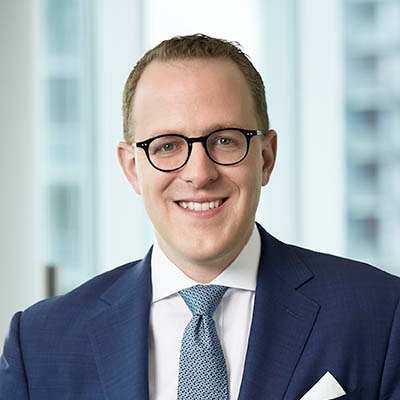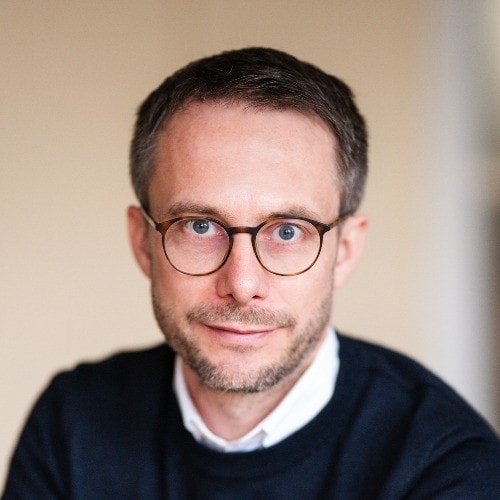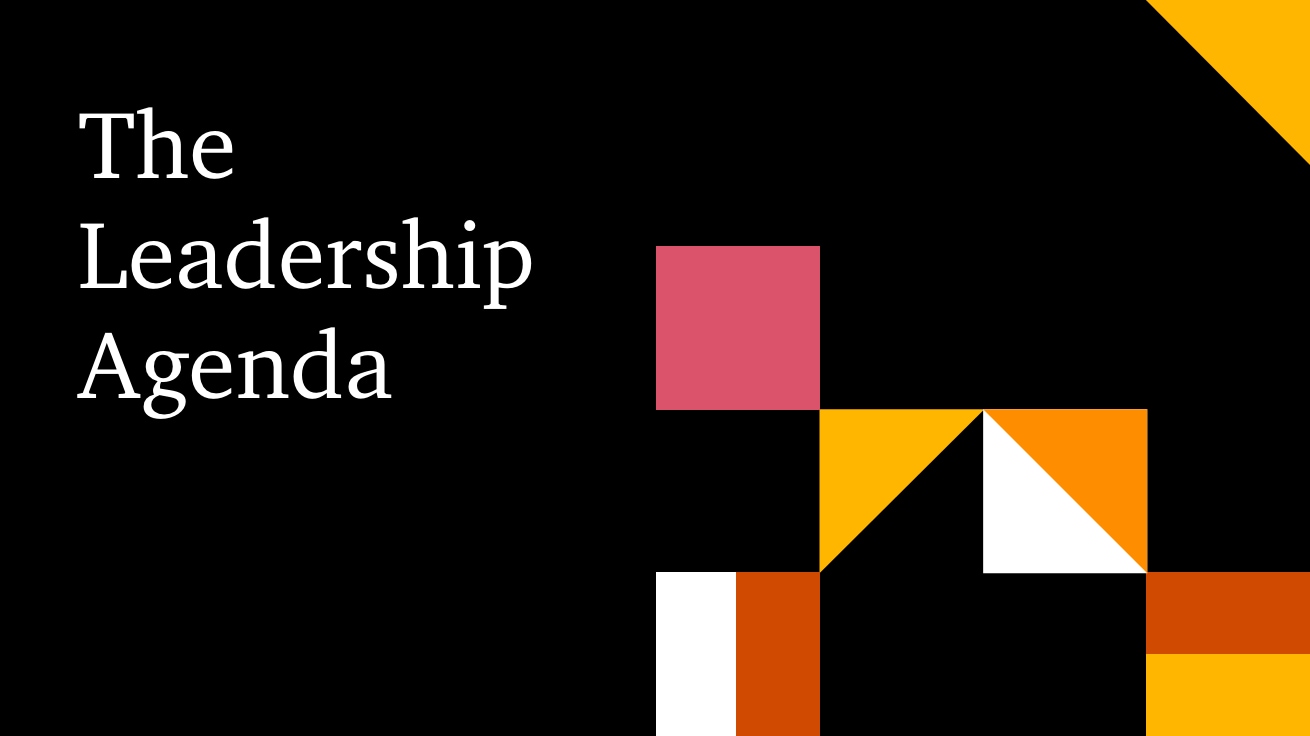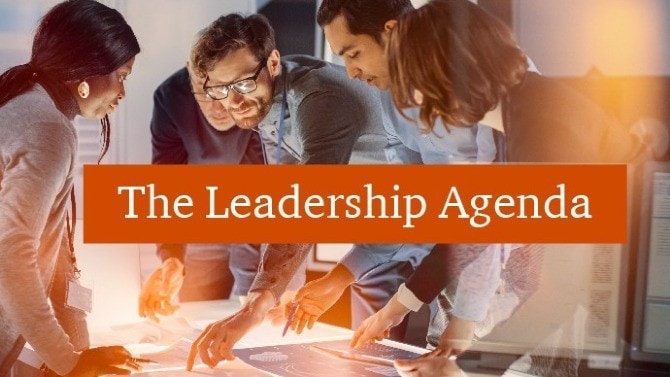
What if we completely rethought the way we build? With insights from Emanuel Heisenberg, CEO and founder of Ecoworks.
This special series of Take on Tomorrow explores PwC's value in motion research, unpacking how the global economy will change over the decade ahead and what that means for business and society. We’ll delve into how business will navigate—and shape—the challenges and opportunities ahead, including emerging technology, climate impacts, and new ways of collaborating across industries.
Along the way, we’ll meet the innovators driving the efforts to tackle society’s greatest challenges and learn how businesses can capture the value that’s in motion and the exponential possibilities that come with it.
This is a modal window.
Beginning of dialog window. Escape will cancel and close the window.
End of dialog window.
What if we completely rethought the way we build? What if the places where we live and work helped cut emissions, and we could drastically improve energy efficiency with a new kind of construction? What if most construction wasn’t even done on-site? These changes, some of them already underway today by businesses establishing new kinds of partnerships, are redefining an age-old industry.
In this episode of our special Take on Tomorrow series, hosts Lizzie O’Leary and Femi Oke speak to Emanuel Heisenberg, CEO and founder of Ecoworks, about how adding a “second skin” to existing structures could revolutionize their use in ways that are good for the planet and the pocketbook. Plus, Greg Oberti, a partner in Capital Projects & Infrastructure at PwC Canada, explains the kinds of cross-industry partnerships being forged and how new opportunities are taking shape that will create value in the decade ahead.
EMANUEL HEISENBERG: If you look at the resources we spend on efficient AI systems or efficient cars, and then you look on the resources and technology we spend on making the houses we live in affordable and better and bring them to the 21st century, it’s very strange decision we take. We desperately have to change something about that.
GREG OBERTI: Societies will benefit and society can benefit because, ultimately, you’ll have more reliable delivery of major projects.
You’ll have more reliable and consistent supply of housing. You’ll be able to build the critical infrastructure of the future at speed and at scale.
EMANUEL: It’s doable to get to a tenth of the cost to build and operate an apartment. I think this is not a vision which is far away. It’s really doable.
FEMI OKE: The way we live, work, buy, and sell is shaped by the structures that we have built over time. What was viable decades or even hundreds of years ago —shapes how we live today.
LIZZIE O’LEARY: But here’s the thing. Trends like urbanization, technology, and the climate transition mean we need to figure out a way to build better and faster. And there’s an opportunity, too: with innovation and new approaches and types of partnerships meeting the moment, all redefining the way we build.
LIZZIE: I’m Lizzie O’Leary, a podcaster and journalist.
FEMI: And I’m Femi Oke, a broadcaster and journalist. And this is a special series of Take on Tomorrow. The podcast from PwC’s management publication, strategy and business.
LIZZIE: Each episode, we look at a different human need: from the way we build, to how we care for each other, make things, or move around. We meet the innovators forging the future and talk to global experts leading the conversation. Charting the next decade of change, we find out how businesses are approaching human needs differently, to create value for companies and society.
FEMI: Today, put on your hard hat—or maybe power up your computer and some industrial robots—as we look at changes in motion to how we build.
LIZZIE: Here to put it all into perspective, we’re excited to be joined by Greg Oberti, a Capital Projects and Infrastructure team partner with PwC Canada. Greg, welcome.
GREG: Thank you for having me.
FEMI: Hi, Greg. Let’s start with the current way that we build. If you could sum it up in a nutshell, how does the industry operate?
GREG: So, when we look at the industry today, it is a very large industry. It’s slated to be over a [US]$13 trillion industry. So it’s quite complex, and it has a lot of elements to it. And I guess that would be one of the key attributes of the industry today, which is, it is in many, many disparate parts. The industry’s typically working across distinct sector specific silos. And you have companies that have struggled across this industry, and in almost every market, with innovation specifically.
LIZZIE: You talked a bit about sector specific silos, like, that sounds like lots of people doing their own thing. Why is there an emergent need to change the way we build right now?
GREG: We’re seeing the complete reconfiguration of entire ecosystems all over the world. When we mean ecosystems, we mean the way in which companies across all industries are operating. And so that lends itself to an imperative to reconfigure and adapt. And as we imagine some of the particular challenges that we need to address—whether it’s housing supply, or shortage thereof, whether it’s climate-related matters, whether it’s energy security, demographic challenges that lend themselves to the imperative of having a more efficient, leaner workforce—all of these kinds of things are lived realities.
FEMI: Greg, thank you. We will come back to you later to hear about how companies are reimagining how we build for the future. But one of the biggest challenges is to do more with less—less material, less labor, less risk, less time, less operational cost, less emissions. So, what if, instead of tearing old buildings down and putting up new ones, you could take an existing structure and layer on a second, more energy-efficient skin?
LIZZIE: And what if you could prefabricate all of that off-site? That’s precisely what a German company called Ecoworks is doing. I spoke to Emanuel Heisenberg, the company’s CEO, who began by explaining to me how their technology works.
EMANUEL: Ecoworks renovates houses, from a very bad status to net zero. So, in the beginning we have to translate everything into data. So we scan the existing buildings; we have a digital twin of the existing house, and then we build the second skin. In traditional renovation, all companies send people to the construction site and send materials to the construction site, and in a very complex process, they renovate these houses. And in our case, we send all the work we can to the factory and let robots do the renovation. We produce facade and roof elements out of bio-based materials, where everything is already installed—like the windows, the insulation, the piping. So it’s an easy plug and play process.
LIZZIE: You know, when you talk about your technological approach, building in a factory, shipping to site, that is very different, I think, than how many people traditionally imagine the construction industry. So, what is your pitch as to why other countries, other markets, should adopt this tech-first approach?
EMANUEL: In construction, we talk about modular construction already for 20, 30 years, but it took two decades to get to the market share. For renovation, I mean, even only in Europe, the renovation market is above 900 billion a year. So it’s a huge market, and it’s 99.9% dominated by traditional ways of construction. What now is really changing the game is robotics and software. If you look at the factories that are working for us, they are totally different than five years ago. When I started and went to the first factories, there were hardly any robots. And now the share of robotics is really massively accelerating, and you see only very few people in these factories. It’s not like an automotive factory, but it’s going in that direction.
LIZZIE: When you are talking about robots in a highly technological factory, what happens to those workers who would be doing this kind of work?
EMANUEL: So, at the moment, if you look at the renovation industry, we have a renovation rate in Germany below 1%. So it would need more than 100 years to renovate our building stock. So we would need like two, three, four x more skilled labor for that sector. But already now, we lack 100,000 skilled labor, craft people in the sector. So it’s really kind of freeing labor for stuff which still people have to do—for example, installing our facades. But it’s not,, like making people redundant. And I think there is really no risk, but just an upside to be more productive.
LIZZIE: It’s sort of like, I mean, if you were to imagine the Venn diagram here, you have a tech company and a construction company, and you exist, kind of, in the middle there. What have you learned from bringing those two very different approaches together under one roof?
EMANUEL: We learned a lot. And, of course we did a lot of things in a not very structured process, or we lost a lot of money on the way and would do things differently. But you have to be a risk taker, and there are some tipping points, where, kind of, the large player enter your game and start to create a platform. So, for example, our largest supplier is one of the three largest off-site production companies for prefabricated houses in Europe. They have a lot of innovation, and now their innovation also pays into our business model. So, this is the same as, for example, in the wind industry, where a lot of suppliers, they innovated the blades or some software components for the wind industry, really made the business model more and more profitable. And this makes a business model more and more attractive to the customer, because the customer knows that they will not have increasing costs, but largely decreasing costs.
LIZZIE: I would imagine that you have to bring a lot of partners into this work. Can you tell me a bit about the partnerships you’re working on and collaborating, you know, companies, people, in any ways that would surprise me?
EMANUEL: Yeah, at the end, you start to transform a very conservative, traditional business. I came as an outsider, as a person coming from energy and renewable energy to the construction world, and it took a couple of years to create a new industry here, at least in Germany. And, of course, at the beginning, you have to take a lot of risks, because you are doing these complex projects. And, of course, the customer does not want to take the risks. So you have to take the risks, and you have to convince the first supplier. But after a while, the supply chain sees that you are an interesting partner. And so this is actually now a great starting point, because a lot of suppliers actually approach us and also research institutions want to work with us in order to create new components or systems for this industry.
LIZZIE: You worked in geothermal and decentralized energy prior to Ecoworks. What kind of experience and expertise from those areas can be applied to how we build?
EMANUEL: It’s still a clash of cultures, even in our company to have, like—the software people are very different to the traditional construction people, which we also need. But I think the sector really needs some outside software and data-driven people to change the sector. And also need people from a climate background, because at the end, the sector consumes 36% of the emissions globally. And in Germany, for example, more than 50% of the waste comes from the sector. And we only reuse 1% of the materials. So we definitely have some climate-minded people transforming the sector.
LIZZIE: You know, when I listen to you talk about renovation and new build and the, sort of, the renovation market share, there are millions of existing buildings out there that theoretically this technology could be used on. How do you get from where we are to that point? What does society need to do in order to benefit from this kind of technology? And I guess also what’s standing in your way?
EMANUEL: If you even look at the potential renovation we have to do in order to get climate neutral in Germany, it’s in the ballpark of 1,500 to 3,000 billion euros in the next 20 years. So, much more than we can actually afford. So I think it's not a question of the potential. It’s more a question of which houses desperately need renovation. And also, we have to focus the resources on a very efficient way to create affordable but also climate-neutral housing. So, if you look at the resources we spend on efficient AI systems or efficient cars, and then you look on the resources and technology we spend on making the houses we live in affordable and better and bring them to the 21st century, it’s a very strange decision we take. And that’s because we rely on a very backward, slow sector, the construction sector. And also the regulatory bodies and the government really don’t understand construction. And that’s why we desperately have to change something about that.
LIZZIE: If you are living in one of these buildings, let’s say you're the tenant of one of your clients, how does your experience change afterwards? Like, do you as a resident notice changes?
EMANUEL: So, of course, after we complete a project, we don’t come to these houses very often, because we have really zero maintenance. So, these prefabricated facade and roof elements are at such a high quality that we extend the lifecycle of these buildings by 70 to 100 years. But if I come back and I bump into tenants—so, for example, I was at a site in Bochum in the west of Germany. I bumped into an older woman, and I asked her, you know, ”How was the winter? How is it to live in such a house?” And she said, like, the rent is more or less unchanged, so it’s a bit higher, but the energy cost also went down because she did not turn on the radiator a single time this winter. So this is, like, typical for our projects. And I think this also makes me very proud as a founder that it’s a very concrete impact.
LIZZIE: If you were to look ahead a decade or even further, do you think how we build will have changed significantly in ten years’ time?
EMANUEL: I hope that we have a good regulatory strategy and that we have large companies, ten, 100 x larger than we are at the moment, and that we can bring down the cost for affordable housing through new builds and renovation by ten x. I think this is easily doable. If you only look at the material cost of the materials we actually assemble, it’s not a problem. It’s really about immensely complex logistics, labor costs, very complex processes. So at the end, we have to really have a supply chain pyramid, like in the automotive industry. And then it’s doable to get to a tenth of the cost to build and operate an apartment. I think this is the vision we all need. And, of course, these apartments should also be climate neutral, or even produce more energy than they consume. So, I think this is not a vision which is far away, it’s really doable. I mean, when I started to be a founder in the climate space, I looked at the cost of wind and solar. like, 18 years ago. It was unthinkable. to get to the costs of today. So, I’m optimistic that in construction, if we have the same drive, it’s doable.
LIZZIE: Emmanuel Heisenberg, thank you so much for your time. This is absolutely fascinating.
EMANUEL: Thanks a lot for having me.
FEMI: Greg, there’s so much to unpack from what Emmanuel shared with us, but what resonated the most from what he said?
GREG: What struck me the most is the way in which Emmanuel contextualized his industry and how he’s operating within it, the opportunities that they see. And when you, kind of, look at a few of the things he talked about, he’s looking at how to forge partnerships in many ways. When you think about the way in which he spoke about his suppliers, for example, or the way in which he looked at the particular problem and the scale of that problem, and quickly realizing that without forging effective and strategic partnerships across his supply chain, you know, it becomes quite difficult to address the sheer scale of what Emmanuel is looking to address. But by forging strong partnerships, good alliances, and having a clear understanding of where that industry is going, he’s forged a path to make a really impactful benefit, frankly, and not only for his company, but for what Germany needs.
LIZZIE: Let’s talk more about partnerships. Ecoworks is an example of a technology-led company coming into an old industry and transforming it. Within the larger build domain, what other examples of partnerships are you seeing?
GREG: Oh, that’s a fantastic question. And one that I too rarely get, ’cause it gets me excited. We’re seeing a lot of innovative partnerships developing as we speak, and this is where you can extract the most value. Now, these partnerships, we’re seeing them develop in ways including, for example, there are real challenges with financing and obtaining capital, frankly, for a lot of, especially, greenfield or new projects in the infrastructure space. And so, we’ve seen companies do quite novel ways of attracting and securing that capital, even before they bid a project. So instead of just showing up for, say, an opportunity and presenting your credentials or a really good pitch for what your company can do, we’re seeing companies do that and bring capital, and bring investors alongside with them. So that’s one example. Another example of the kind of alliances we’re seeing is lead times for specific components. Like, say, take for example a power plant project. Those lead times for those specific components can be very, very long. And in some cases, over, well more than multiple months. You’re talking about two or three years. So, we’re seeing construction and engineering firms forge alliances with major manufacturing firms or firms that make specialized products. So, think of, like, a transformer, say, for a power plant. And for a construction engineering firm to be able to bid a project and be able to say to a recipient of their bid. “Hey, I have, for example, an alliance with one or two of the only producers, or the most reputable producers, of this particular technology, or this particular widget, in the world.” It puts you in, frankly, an unassailable position. It’s kind of, in many ways I’m thinking right now about a moat, right? It’s a very, very, very strong moat within which to play and to compete.
FEMI: Greg, you just touched on some of the current construction industry challenges. So if business leaders are going to overcome them, they’re going to have to think about business models differently. What new approaches do you foresee the industry will come up with in this space?
GREG: You know, I still remember—on the side, I’m an adjunct professor at a university. I often like to joke with my students, you know. In the last millennium, we often spoke about disaggregated supply chains, just in time, lowest cost suppliers, and all of the hallmarks of, you know, an increasingly globalized world. And, of course, we are still in a highly globalized world. But it’s one in where the innovations will be around creating security. I dont mean this from the perspective of defense. I mean this in the sense of delivery, right? So those innovations and those enablers to ensure that a project gets done more or less on time and on budget. And it is imperative for participants to understand where are we strong and where do we need to find help.
LIZZIE: When we think about these new ways of building, what role does AI play, or can AI play, in speeding up and helping, sort of, transition to what’s next?
GREG: AI can play, absolutely play a role, and it is very useful, making sure that the right people are at the right place, with the right skill set, doing the right jobs at the right time, on a particular construction site. If you look at your typical construction project, there’s a lot of people going on, and frankly, there’s a bit of a choreography. It’s like managing or delivering multiple plays at once, for those that are into the theater world. So AI can play a discrete and distinct role, where it can play to optimize the way in which labor’s deployed on a particular construction site. But it can do a lot more than that. So for example, many construction companies have been using, for over a decade now, IOTs, right? So, internet of things, to help measure every single aspect of a job site from where workers are onsite, how they move around a site, the type of equipment that they’re using, the atmospheric reality in the building as it’s built, monitoring for water or other risks on a particular site. And it’s quite powerful. Now imagine combining all the data that companies pick up in real time, and also that look back upon, from a site, with an AI capability set. And we will invariably, and I think almost for sure, identify entire new ways to pick up on, on ways to deliver projects efficiently.
LIZZIE: Greg, when I listen to you, it sounds like you’re saying there are tremendous possibilities for society if we can get this right.
GREG: The possibilities are enormous, tremendously exciting as well. Societies will benefit and society can benefit, because, ultimately, you’ll have more reliable delivery of major projects. You’ll have more reliable and consistent supply of, say, housing. You’ll be able to build the critical infrastructure of the future at speed and at scale. And ultimately, governments and policymakers will benefit by having a more reliable ecosystem, or build domain, to tap into, in order to deliver the homes, the buildings, the factories, the power-generating assets of the future.
FEMI: So, Greg, if we fast forward a decade from now, what will we see in the world of building and what impact will that change and those changes have on us?
GREG: I guess I’m becoming a futurist now, aren’t I?
FEMI: Take us into the future, guru Greg. How do you see it? Prognosticate for us.
GREG: We see those companies that are successful will be companies that are more strategically disciplined. And those companies that are not strategic may be fine. But the downside risk of not thinking through where you fit within your ecosystem and in these domains is significant. And we don’t say this from a sort of fear-mongering perspective, because there’s massive opportunity here. And in some cases, it may not even require significant investment. It just requires intelligent alliancing and partnerships in win-win type situations across value chains within these domains.
LIZZIE: Greg, thank you so much for coming on, for talking with us and helping us think about solving these problems.
GREG: Oh, thank you, Lizzie. And thank you, Femi. It was absolutely a privilege to be on. Thank you.
LIZZIE: Femi, that was an absolutely fascinating conversation, and I think I’m really struck by how much it cuts across different industries and, sort of, how these Venn diagrams need to nestle among and between traditional companies to deliver this future that both Emmanuel and Greg were talking about.
FEMI: And that concept of partnership, it can’t be done in silos. If we’re going to do better, if we’re going to change the way that we build, we’re going to have to team up.
LIZZIE: That’s it for this episode. Please follow Take on Tomorrow wherever you listen to podcasts. And if you learned something new, then please leave a review, it really helps others find the show. For more, visit pwc.com/takeontomorrow.
FEMI: Join us next time as we explore new ways of transporting people and goods. Could it be a future without traditional cars?
ROBIN CHASE: Business should and can be and will be helping us go from that heavy, expensive, elite way of moving to one that is nimble, more democratic, more inclusive, and more suitable to the environments in which we live.
LIZZIE: Take on Tomorrow is brought to you by PwC’s strategy and business. PwC refers to the PwC network and/or one or more of its member firms, each of which is a separate legal entity.

Lizzie O'Leary
Podcaster and journalist

Femi Oke
Podcaster and journalist

Greg Oberti
Capital Projects & Infrastructure, Partner, PwC Canada

Emanuel Heisenberg
CEO and founder Ecoworks

What if we completely rethought the way we build? With insights from Emanuel Heisenberg, CEO and founder of Ecoworks.

Hear how AI, innovation and collaboration are transforming how we care. With insights from CEO of meta[bolic], Ali Hashemi.

Hear exclusive insights on how leaders can compete in a new energy era. With insights from founder of The Mobility House, Thomas Raffeiner.

PwC’s Matt Wood discusses how leaders can ensure transparency, accountability and trust in AI as it becomes more embedded in our everyday lives.

Generative AI promises to transform productivity. This Take on Tomorrow episode explores its impact on the labor market and workplace trends.

In this episode of the Take on Tomorrow podcast, business leaders from Patagonia and PwC discuss balancing environmental impact while delivering financial performance.

Explore APAC’s role in global growth and resilience in this special Take on Tomorrow episode with PwC’s Mohammad Kande.

Explore how businesses can innovate to survive. Guests Daniel Susskind and Matthew Duffey discuss the keys to long-term viability and growth in this episode.

Discover how businesses can secure future food systems in this episode of Take on Tomorrow with Rob Cameron of Nestlé and Stuti Sethi of Strategy&.

Explore the quantum revolution's impact on business and society with experts on Take on Tomorrow.

Discover how businesses turn climate challenges into growth. Join Lizzie O’Leary at Climate Week NYC with Helen Clarkson on Take on Tomorrow by PwC.

SAP’s Chief Revenue Officer reveals what it takes to strengthen supply chain networks amid continuous disruption. Listen now.

Microsoft’s Chief Security Advisor in EMEA, Sarah Armstrong-Smith, joins the podcast to discuss how generative AI serves as both challenge and safeguard for cyber defense. Listen now.

As global urbanization accelerates, cities can position themselves to grow more inclusive and resilient by harnessing technology and data. Listen now.

How can CEOs position their businesses for success in an age of continuous reinvention? Listen now.

How can reducing energy demand accelerate the climate transition and create economic opportunity? Listen now.

The rapid advancement of generative AI is heralding a new era for workers—and charging leaders with a responsibility to navigate unprecedented opportunities. Listen now.

Discover the current impact of climate technology—and its emerging trends—in this special episode, recorded live at the COP28 climate change conference. Listen now.

Climate action is lagging, despite increased awareness of its urgency. How can progress be accelerated? Listen now.

Today’s tensions vs. tomorrow’s threats: how can CEOs master the balancing act? Find out—and hear the big takeaways from our 2023 CEO Survey. Listen now.

In Episode 12 of the Take on Tomorrow podcast from strategy+business, Alison Rose, CEO of NatWest Group, explores how financial institutions are prioritising climate change.

We live in a world of ever-increasing mobility. Find out what business should do to adjust and prepare. Listen now.

In Episode 9 of the Take on Tomorrow podcast from strategy+business, author Azeem Azhar exploresthe societal implications of fast-evolving technologies.

The number of young people in the labor force is falling fast. Learn how businesses can give people the skills to find work and succeed. Listen now.

In Episode 8 of the Take on Tomorrow podcast from strategy+business, PwC’s Pete Brown explores how employers can find opportunity in an era of changing expectations.

In Episode 7 of the Take on Tomorrow podcast from strategy+business, PwC’s Ian Milborrow explores the pitfalls and potential of carbon taxation.

In Episode 6 of the Take on Tomorrow podcast from strategy+business, business ethics scholar Alison Taylor discusses how diverse stakeholders are driving change.

In-depth analysis, quick-hit summaries, interactive data, and visual storytelling to inform and inspire the C-suite.

Sharp, actionable insights curated to help global leaders build trust and deliver sustained outcomes.
AI, climate change and geopolitical shifts are reconfiguring the global economy. We’ve mapped where value is moving over the next decade, so you can build a future-ready business to capture it.
Sharp, actionable insights curated to help global leaders build trust and deliver sustained outcomes.
Global Clients and Industries Leader, Partner, London, PwC United Kingdom
© 2017 - 2025 PwC. All rights reserved. PwC refers to the PwC network and/or one or more of its member firms, each of which is a separate legal entity. Please see www.pwc.com/structure for further details.


